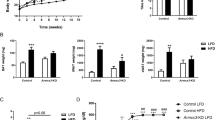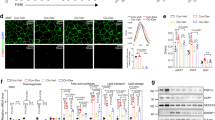Abstract
OBJECTIVE: Glucocorticoids are well-known regulators of energy turnover and adipose tissue metabolism. We investigated the effect of glucocorticoids on the expression of the human uncoupling protein 2 (UCP 2) gene, which has been implicated in energy expenditure.
DESIGN: Prednisolone (25 mg) was administered orally daily for 7 days. Subcutaneous adipose tissue UCP 2 mRNA was measured before and after treatment.
SUBJECTS: Eight healthy female subjects (age 52–63 y; body mass index 25–34 kg/m2).
RESULTS: No differences in body weight, waist-to-hip ratio or plasma-values of FFA or glucose were found after prednisolone treatment, as compared to pre-treatment values under these conditions. In contrast, plasma insulin levels were significantly increased by glucocorticoid administration, 54±6 before vs 70±12 (mean±sem) pmol/l after treatment (P=0.028). Furthermore, using RT-competitive-PCR, the UCP 2 mRNA level in abdominal subcutaneous adipose tissue was found to be down-regulated by half (6.3±0.4 vs 3.1±0.8 amol/µg RNA, P=0.012) after glucocorticoid treatment. No difference in expression levels of the reference gene 18SrRNA was observed before, as compared to after prednisolone exposure (249±11 vs 248±30 amol/µg RNA, P=0.87).
CONCLUSION: These data suggest that glucocorticoids may play a role in the regulation of UCP 2 mRNA expression in human adipose tissue in vivo.
This is a preview of subscription content, access via your institution
Access options
Subscribe to this journal
Receive 12 print issues and online access
$259.00 per year
only $21.58 per issue
Buy this article
- Purchase on Springer Link
- Instant access to full article PDF
Prices may be subject to local taxes which are calculated during checkout


Similar content being viewed by others
References
Kirk LF Jr . Hash RB, Katner HP, Jones T. Cushing's disease: clinical manifestations and diagnostic evaluation Am Fam Physician 2000 62: 1119–1127, 33–34.
Bjorntorp P, Rosmond R . Neuroendocrine abnormalities in visceral obesity Int J Obes Relat Metab Disord 2000 24: (Suppl 2): S80–S85.
Ottosson M, Vikman-Adolfsson K, Enerback S, Olivecrona G, Bjorntorp P . The effects of cortisol on the regulation of lipoprotein lipase activity in human adipose tissue J Clin Endocrinol Metab 1994 79: 820–825.
Ottosson M, Lonnroth P, Bjorntorp P, Eden S . Effects of cortisol and growth hormone on lipolysis in human adipose tissue J Clin Endocrinol Metab 2000 85: 799–803.
Rebuffe-Scrive M, Bronnegard M, Nilsson A, Eldh J, Gustafsson JA, Bjorntorp P . Steroid hormone receptors in human adipose tissues J Clin Endocrinol Metab 1990 71: 1215–1219.
Fleury C, Neverova M, Collins S, Raimbault S, Champigny O, Levi-Meyrueis C, Bouillaud F, Seldin MF, Surwit RS, Ricquier D, Warden CH . Uncoupling protein-2: a novel gene linked to obesity and hyperinsulinemia. [See comments]. Nature Genet 1997 15: 269–272.
Boss O, Samec S, Paoloni-Giacobino A, Rossier C, Dulloo A, Seydoux J, Muzzin P, Giacobino JP . Uncoupling protein-3: a new member of the mitochondrial carrier family with tissue-specific expression FEBS Lett 1997 408: 39–42.
Ricquier D, Bouillaud F . The uncoupling protein homologues: UCP1, UCP2, UCP3, StUCP and AtUCP Biochem J 2000 345: 161–179.
Boss O, Hagen T, Lowell BB . Uncoupling proteins 2 and 3: potential regulators of mitochondrial energy metabolism Diabetes 2000 49: 143–156.
Moriscot A, Rabelo R, Bianco AC . Corticosterone inhibits uncoupling protein gene expression in brown adipose tissue Am J Physiol 1993 265: E81–87.
Scarpace PJ, Matheny M, Moore RL, Kumar MV . Modulation of uncoupling protein 2 and uncoupling protein 3: regulation by denervation, leptin and retinoic acid treatment J Endocrinol 2000 164: 331–337.
Gong DW, He Y, Karas M, Reitman M . Uncoupling protein-3 is a mediator of thermogenesis regulated by thyroid hormone, beta3-adrenergic agonists, and leptin J Biol Chem 1997 272: 24129–24132.
Auboeuf D, Vidal H . The use of the reverse transcriptioncompetitive polymerase chain reaction to investigate the in vivo regulation of gene expression in small tissue samples Anal Biochem 1997 245: 141–148.
Millet L, Vidal H, Andreelli F, Larrouy D, Riou JP, Ricquier D, Laville M, Langin D . Increased uncoupling protein-2 and -3 mRNA expression during fasting in obese and lean humans J Clin Invest 1997 100: 2665–2670.
Yamamoto KR . Steroid receptor regulated transcription of specific genes and gene networks A Rev Genet 1985 19: 209–252.
Tu N, Chen H, Winnikes U, Reinert I, Marmann G, Pirke KM, Lentes KU . Molecular cloning and functional characterization of the promoter region of the human uncoupling protein-2 gene Biochem Biophys Res Commun 1999 265: 326–334.
Bao S, Kennedy A, Wojciechowski B, Wallace P, Ganaway E, Garvey WT . Expression of mRNAs encoding uncoupling proteins in human skeletal muscle: effects of obesity and diabetes Diabetes 1998 47: 1935–1940.
Krook A, Digby J, O'Rahilly S, Zierath JR, Wallberg-Henriksson H . Uncoupling protein 3 is reduced in skeletal muscle of NIDDM patients Diabetes 1998 47: 1528–1531.
Pinkney JH, Boss O, Bray GA, Bulmer K, Coppack SW, Mohamed-Ali V . Physiological relationships of uncoupling protein-2 gene expression in human adipose tissue in vivo J Clin Endocrinol Metab 2000 85: 2312–2317.
Nordfors L, Hoffstedt J, Nyberg B, Thorne A, Arner P, Schalling M, Lonnqvist F . Reduced gene expression of UCP2 but not UCP3 in skeletal muscle of human obese subjects Diabetologia 1998 41: 935–939.
Oberkofler H, Liu YM, Esterbauer H, Hell E, Krempler F, Patsch W . Uncoupling protein-2 gene: reduced mRNA expression in intraperitoneal adipose tissue of obese humans Diabetologia 1998 41: 940–946.
Simoneau JA, Kelley DE, Neverova M, Warden CH . Overexpression of muscle uncoupling protein 2 content in human obesity associates with reduced skeletal muscle lipid utilization FASEB J 1998 12: 1739–1745.
Clapham JC, Arch JR, Chapman H, Haynes A, Lister C, Moore GB, Piercy V, Carter SA, Lehner I, Smith SA, Beeley LJ, Godden RJ, Herrity N, Skehel M, Changani KK, Hockings PD, Reid DG, Squires SM, Hatcher J, Trail B, Latcham J, Rastan S, Harper AJ, Cadenas S, Buckingham JA, Brand MD, Abuin A . Mice overexpressing human uncoupling protein-3 in skeletal muscle are hyperphagic and lean Nature 2000 406: 415–418.
Acknowledgements
The skilful technical assistance of Eva Sjölin is highly appreciated. This study was supported by grants from the Foundation of Thuring and the Swedish Society of Medicine.
Author information
Authors and Affiliations
Corresponding author
Rights and permissions
About this article
Cite this article
Uddén, J., Folkesson, R. & Hoffstedt, J. Downregulation of uncoupling protein 2 mRNA in women treated with glucocorticoids. Int J Obes 25, 1615–1618 (2001). https://doi.org/10.1038/sj.ijo.0801801
Received:
Revised:
Accepted:
Published:
Issue Date:
DOI: https://doi.org/10.1038/sj.ijo.0801801



